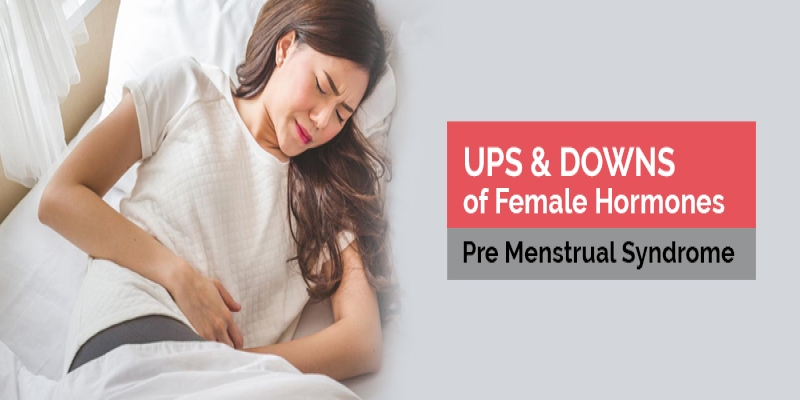Ups & Downs of Female Hormones - Pre Menstrual Syndrome
2019-12-25 / RG STONE HOSPITAL / Urological Treatment

Many women just dread their periods!
This is because they experience abnormal bleeding patterns and pain as a normal occurrence.
They do not even realize that they are suffering from any condition since they get accustomed to this.
The abnormality in menstrual cycles may affect women in the prime of their life, not only reproductively but also productively.
The uterus is an important part of the female body. It is the organ where the baby grows in a pregnant female until birth.
Every month, the ovary releases an egg; which if left unfertilized, causes the thickened lining of the uterus to shed during menstruation.
Every woman is different! Every month, the symptoms differ ranging from mild cramps to exhausting pain.
This pain is a common symptom of the monthly cycle that every woman faces during her reproductive phase of life.
But, if it interferes with the daily activities, it should be get examined and treated, as there may be some underlying pathologies to it.
Irregular cycles, inter-menstrual bleeding, and/or heavy bleeding must not be ignored. More so, the women in earlier and later years of life may face various issues, somewhere between 12-15 years and 47-55 years.
Hormonal imbalances during the late 40s are not a part of PMS but usually peri-menopause.
One-third of women do not suffer any symptoms, some face very minor issues, while some face very serious issues.
Pre-menstrual syndrome (PMS) comes as a part of the package and is considered to be normal mood changes.
Apart from pregnancy and breastfeeding, the two hormones, Oestrogen, and progesterone play a significant role in the wide array of physical and emotional symptoms.
PMS starts 5 – 10 days before menses start (after ovulation) and goes away once the flow begins. During this time, a woman may get irritable, feel bloated, get sore or tender breasts, experience back pain, crave sweets, get constipated, get acne, get anxious and experience emotional outbursts, and face sleep disturbances, get decreased libido, and face mood swings.
Female workers tend to become nasty at work. But, some women suffer from Pre-menstrual Dysphoric Disorder (PDD) that may even lead to depression or even suicide.
Women with a history of depression, mood disorders, or family history of psychological illnesses are more prone to get affected by such mental symptoms.
Women can try to escape this or at least try to reduce the symptoms by certain lifestyle and dietary modifications. During such days, the diet should be rich in complex carbohydrates and less in sugary components.
Vitamin B Complex supplementation can also help balance the effects of the hormones.
Increasing physical activities, especially aerobics can also help reduce the symptoms.
It is not one’s fault to face these symptoms and get upset about it.
This is a phase and passes off. Simple things like back massage, dark chocolates, a cup of coffee, eating frequent small meals, limiting salty foods can definitely help ease your mood and cramps.
Also, foods rich in calcium and multivitamin supplements can help in relieving the symptoms.
One must drink plenty of fluids so as to ease the abdominal bloating.
Also eating lots of fruits and vegetables is also beneficial. Sleeping for at least 8 hours can keep one away from fatigue.
Some women (10 – 15 percent) tend to suffer more and maybe prescribed oral contraceptive pills or low-dose anxiety drugs, anti-inflammatory drugs under the supervision of the doctor.
Psychological counseling and reassurance also play tricks at times.
Medical interventions are commonly sought by the working class of women.
This class of women should plan their working days such that they do not have presentations, tax filings during the last days of the cycle.
The key is to perform difficult tasks during the initial phase of the cycle.
Consulting the doctor in case of severe symptoms is a must because many other medical conditions might also give similar symptoms such as irritable bowel syndrome, hypothyroidism, and or pregnancy.
Today’s women are confident and talk about their problems and tend to escape them more efficiently rather than older generations who thought that talking about periods is something shameful.
Categories
Hernia Repair
Appendicitis
Piles
Urological Treatment
Hernia treatment
Enlarged Prostate (BPH)
Gall Bladder Stone
Urinary / Kidney Stone
Vitamins
Indian Health Care System
Exercise
Obesity
Female Urinary Incontinence
Single Incision Laparoscopic Surgery (SILS)
Kidney Cancer
Bladder Cancer
Ovarian cancer
Nephrology
Bariatric Surgery
Kidney Function Test
Female Urology
Radiation Therapy
Alcoholic Fatty Liver
Liver disease
Gastroenterology
Kidney Disease
Nutrition & Health
Lung Cancer

